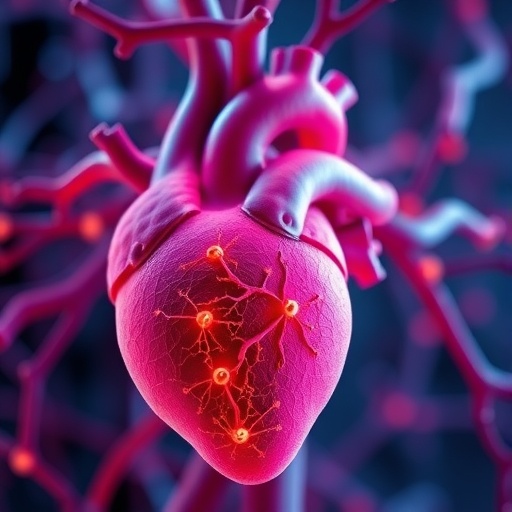The intricate relationship between inflammation and metabolism, a field known as immunometabolism, has emerged as a pivotal focus within cardiovascular research, particularly in understanding heart failure. This multifaceted interplay is not merely a consequence of cardiac dysfunction but rather a vital component in both the onset and progression of heart failure, irrespective of its underlying causes, such as ischemic injury or systemic metabolic disorders. Inflammation, often coupled with metabolic stress and comorbid conditions, represents a complex web of interactions that significantly influences cardiac health.
At the heart of this discussion lies the response of the immune system to cardiac injury. Ischemic events and metabolic derangements lead to the infiltration of both innate and adaptive immune cells into the myocardium, causing a cascade of biological responses. These infiltrating immune cells exhibit a remarkable ability to polarize towards either pro-inflammatory or anti-inflammatory phenotypes. The determination of their fate hinges on various intrinsic cellular metabolic pathways that involve significant shifts in energy production, predominantly oxidative phosphorylation, and anaerobic glycolysis. This polarization is not a peripheral activity; rather, it plays an essential role in either exacerbating cardiac pathology or fostering recovery.
Moreover, it’s crucial to consider the bidirectional nature of this relationship. The immune cells that migrate into the heart do not merely act as passive responders; they actively modulate both cardiac and systemic metabolism. This modulation creates a feedback loop where the altered metabolic state of the myocardium can influence immune cell behavior, thus perpetuating the cycle of inflammation and dysfunction. This metabolic crosstalk contributes to adverse cardiac remodeling, a process frequently associated with worsening heart failure outcomes.
In the context of heart failure, the systemic effects of inflammation cannot be understated. As ischemic injuries and metabolic disturbances prevail, they stimulate myelopoiesis, not just in the bone marrow but in extramedullary sites as well. This increased production of immune cells drives further recruitment to the myocardium, aggravating the chronic inflammatory state often observed in patients with heart failure. This phenomenon highlights the complex interplay between systemic and local inflammatory responses, emphasizing the need for targeted interventions that can disrupt this cycle.
Pharmacological strategies aimed at modulating metabolism have recently shown promise in enhancing outcomes for heart failure patients. By targeting metabolic pathways, these interventions may help shift the immune response towards a more beneficial state. However, the transition towards immunomodulatory strategies faces numerous challenges. The intricate nature of immune cell interactions, along with the potential for off-target effects and the difficulty of specifically modulating immune responses without compromising overall immune function, complicates the development of effective therapies.
Understanding the metabolic pathways involved in immunometabolism is not only crucial for developing new therapeutic approaches but also for creating non-invasive methods to monitor these processes in patients. As the field evolves, researchers are increasingly interested in leveraging novel imaging techniques and biomarkers to elucidate the metabolic states of both immune cells and cardiac tissue. Such advancements could provide invaluable insights into individual patient responses to therapies, ultimately guiding more personalized treatment strategies.
In summary, the ongoing exploration of immunometabolism in the context of heart failure opens new avenues for research and therapy. As scientists strive to disentangle the complex interactions between inflammation and metabolism, the potential for groundbreaking therapies increases. The goal is clear: transition from a maladaptive, chronic inflammatory state towards one that is cardioprotective, with the ultimate aim of improving patient outcomes.
The urgency of this research is amplified by the high burden of heart failure on global health systems. In many cases, recognizing the signs of heart failure early and providing timely interventions can drastically alter the disease trajectory. Thus, the integration of immunometabolic principles into clinical practice could revolutionize how clinicians approach treatment for heart failure, ensuring that patients receive the most effective therapies tailored to their specific conditions.
As we forge ahead in understanding immunometabolism’s role in heart failure, collaboration across disciplines—spanning cardiology, immunology, and metabolic research—will be essential. Such cooperative efforts can catalyze innovative solutions and validate therapeutic strategies, ultimately enhancing the quality of care for those afflicted by this complex disease.
The journey towards clarifying the mechanisms of immunometabolism is both a scientific endeavor and a clinical imperative. Continued research efforts promise to unveil further intricacies and potential therapeutic targets. As we deepen our understanding, we cultivate hope not only for improved treatments but also for better patient education regarding the interconnectedness of diet, metabolism, and heart health.
Looking ahead, the challenge remains to translate these emerging insights into actionable clinical guidelines. As more becomes known about the cellular and molecular mechanisms governing immunometabolism in heart failure, the scientific community must strive to stay at the forefront of this evolving landscape, ensuring that all patients benefit from the latest advancements in research.
Ultimately, the field is poised for an exciting evolution. With the promise of new therapies and a clearer understanding of disease mechanisms, the future of heart failure management could potentially be revolutionized, leading to better outcomes and enhanced quality of life for countless individuals affected by this debilitating condition.
Subject of Research: Immunometabolism in Heart Failure
Article Title: Immunometabolism in Heart Failure
Article References:
Andreadou, I., Ghigo, A., Nikolaou, PE. et al. Immunometabolism in heart failure. Nat Rev Cardiol 22, 751–772 (2025). https://doi.org/10.1038/s41569-025-01165-8
Image Credits: AI Generated
DOI:
Keywords: Immunometabolism, Heart Failure, Inflammation, Metabolism, Cardiovascular Research, Therapeutic Strategies, Chronic Inflammation, Immune Cells, Pharmacological Interventions, Personalized Treatment.




